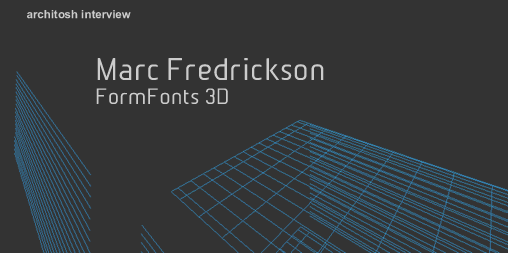Over the summer we spoke to Marc about FormFonts 3D. And we learned several interesting things we think readers will want to know about. Marc is not your ordinary Web start-up guy, but rather a registered architect in California whose master’s in architecture thesis ended up a SIGGRAPH presentation demonstrating what was possible — one day — with virtual 3D shopping environments.
Marc’s circuitous background takes him from SIGGRAPH presentations to the world of 3D gaming, to mapping out cities like Paris and London and Toyko to designing and building his own house in San Diego using SketchUp. Now he helps lead FormFonts 3D.
In this interview Marc tells us about himself, about what FormFonts 3D offers content users today and where FormFonts 3D will eventually go. And yes, if you haven’t yet guessed, this too has something to do with BIM!
The formation of FormFonts 3D
AFR: Marc, can you tell me about how FormFonts 3D got started?
(Marc Fredrickson): Fred Abler, the founder and CEO, started a website in 2001 called Objective Networks. People uploaded 3D SketchUp models and the models were downloaded more than 4 million times in less than two years. There was no cost to participate. However, the problem of the model quality and consistency became paramount. Even though there was a rating system, people uploaded many poor quality models and few good ones. Fred needed to either close the site or start a pay-for service where people would know that they could find high quality, low polygon models as well as textures. This is when I, one programmer and many great 3D artists hooked up with Fred to start FormFonts.
And what is your background? I understand you have an architectural degree and have been involved in practice?
(MF): I attended Cal Poly State University-San Luis Obispo and got my undergraduate architectural degree. After working for a few years for an architecture firm, I returned to school to get a graduate degree in Architecture from University of California San Diego. The architecture program was just getting started and many resources were available, including access to the super computer center. Back in 1993 my thesis was a real-time rendered virtual shopping mall called ‘In the Bag.’ A couple of programmers and I worked on it. We showed the thesis at SIGGRAPH 1994 in Orlando, Florida.
At the time, video games were about to transition to 3D environments. The guys at Angel Studios — who did the CG for “Lawnmower Man” and Peter Gabriel’s music video “Kiss that Frog” — had just signed a contract with Nintendo to make games for the N64…and they offered me a job. Since San Diego was still in a recession at the time, I decided to have some fun making video games for a while and then when the economy got better, get an architecture job. But I was having so much fun I stayed with Angel Studios (later bought by Rockstar Games) for 10 years.
And what kinds of things did you do as a trained architect working at a video gaming company?
I worked on Midnight Club, an open-city based driving game. I had the best job – traveling to Tokyo, Paris, New York, and London among others to research and map the city for the game. I wore many hats such as 3D artist, lead 3D artist, environment artist, level designer, game designer, game design department head and office space planner.
During my 10 years making video games I was able to exercise my architectural skills designing and drawing up the plans for a few friends. Moonlighting wasn’t a problem since the clients worked at Angel Studios. I feel fortunate that I had got my architecture license right before starting to make video games and was able to keep doing architectural work.
I understand that you designed and built your own house….using SketchUp.






Reader Comments
Comments for this story are closed